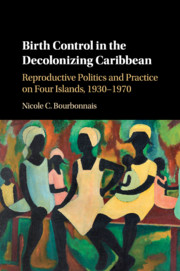 Birth Control in the Decolonizing Caribbean
Birth Control in the Decolonizing Caribbean Book contents
- Frontmatter
- Dedication
- Contents
- List of Figures, Maps, and Tables
- Acknowledgments
- List of Acronyms
- Introduction
- 1 The Answer, an Aid, a Right: Birth Control Debates and Social Movements in the Caribbean
- 2 From Politics to Practice: The Colonial Office, Foreign Activists, and Local Family Planning Clinics
- 3 Beyond Culture or Choice: Working-Class Families and Birth Control Clinics
- 4 A Matter of Cost: Reproductive Politics, State Family Planning Programs, and Foreign Aid in the Transition to Independent Rule
- Conclusion
- Bibliography
- Index
2 - From Politics to Practice: The Colonial Office, Foreign Activists, and Local Family Planning Clinics
Published online by Cambridge University Press: 06 January 2017
- Frontmatter
- Dedication
- Contents
- List of Figures, Maps, and Tables
- Acknowledgments
- List of Acronyms
- Introduction
- 1 The Answer, an Aid, a Right: Birth Control Debates and Social Movements in the Caribbean
- 2 From Politics to Practice: The Colonial Office, Foreign Activists, and Local Family Planning Clinics
- 3 Beyond Culture or Choice: Working-Class Families and Birth Control Clinics
- 4 A Matter of Cost: Reproductive Politics, State Family Planning Programs, and Foreign Aid in the Transition to Independent Rule
- Conclusion
- Bibliography
- Index
Summary
The enthusiasm in the air was palpable on March 20, 1939, when over 100 men and women gathered at the Esquire Restaurant in Kingston. A veritable who's who of politically active middle-class Jamaicans spoke of their pride in Jamaica, their commitment to social and political advance, and the spirited climate prevailing since the 1938 labor rebellion; as Honorable E.E.A. Campbell claimed, Jamaica “had made more progress in ten months than she had during the first century of emancipation.” The dinner focused on honoring Mary Morris Knibb for making history as the first woman to be elected to the Kingston and St Andrew Corporate Council. But activists also used the opportunity to say farewell to British feminist Edith How-Martyn, who had just completed an eleven-week long birth control lecture tour of the island. Social worker Amy Bailey recalled her efforts to recruit How-Martyn during a trip to London the year before and praised How-Martyn for standing beside her “sisters” and for showing “no narrow-mindedness or pettiness of race, colour or creed.” The mayor of Kingston Dr. Oswald Anderson called How-Martyn
the type of link they wanted with England and Jamaica. It was a link not so much connected with monthly pay cheques or the Colonial Office, but it was one of culture and Jamaica would always welcome her again (hear, hear).
After a presentation from Alma LaBadie on behalf of the Women's Liberal Club, How-Martyn closed the dinner by giving her thanks and announcing the formation of the first ever Jamaica Birth Control League, encouraging the audience to contact Honorary Secretary May Farquharson for more information.
The nationalist fervor present at the Esquire restaurant that day joined a larger chorus spreading across the British Empire in the early twentieth century. Activists from Asia to Africa to the Caribbean called out the fundamental injustices of the colonial system and demanded self-determination. This pressure from the colonies prompted a number of reforms in the Caribbean in the 1940s and 1950s, including the implementation of universal suffrage and the creation of a locally elected prime minister with expanded powers, paving the way for the creation of modern political parties. But the British did not resign from the colonial project so easily; on the contrary, the Colonial Office committed itself to a series of “social welfare” and “development” initiatives in the post–World War II period meant to defend and revitalize the empire.
- Type
- Chapter
- Information
- Birth Control in the Decolonizing CaribbeanReproductive Politics and Practice on Four Islands, 1930–1970, pp. 76 - 127Publisher: Cambridge University PressPrint publication year: 2016


